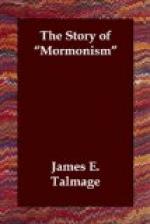Changes many and great followed in bewildering succession in Utah. The people were besought to take sides with the South in the awful scenes of cruel strife; it was openly stated in the east that Utah had allied herself with the cause of secession; and by others that the design was to make Salt Lake City the capital of an independent government. And surely such conjectures were pardonable on the part of all whose ignorance and prejudice still nursed the delusion of “Mormon” disloyalty. Moreover, had the people been inclined to rebellion what greater opportunity could they have wished? Already a North and a South were talked of—why not set up also a West? A supreme opportunity had come and how was it used? It was at this very time that the Overland Telegraph line, which had been approaching from the Atlantic and the Pacific, was completed, and the first tremor felt in that nerve of steel carried these words from Brigham Young:
Utah has not seceded, but
is firm for the constitution
and laws of our country.
The “Mormon” people saw in their terrible experiences and in the outrages to which they had been subjected, only the mal-administration of laws and the subversion of justice through human incapacity and hatred. Never even for a moment did they question the supreme authority and the inspired origin of the constitution of their land. They knew no North, no South, no East, no West; they stood positively by the constitution, and would have nothing to do in the bloody strife between brothers, unless indeed they were summoned by the authority to which they had already once loyally responded, to furnish men and arms for their country’s need.
Following the advent of the telegraph came the railway; and the land of “Mormondom” was no longer isolated. Her resources were developed, her wealth became a topic of the world’s wonder; the tide of immigration swelled her population, contributing much of the best from all the civilized nations of the earth. Every reader of recent and current history has learned of her rapid growth; of her repeated appeals for the recognition to which she had so long been entitled in the sisterhood of states; of the prompt refusals with which her pleas were persistently met, though other territories with smaller and more illiterate populations, more restricted resources, and in every way weaker claims, were allowed to assume the habiliments of maturity, while Utah, lusty, large and strong, was kept in swaddling clothes. But the cries of the vigorous infant were at length heeded, and in answer to the seventh appeal of the kind, Utah’s star was added to the nation’s galaxy.
But let us turn more particularly to the history of the Church itself. For a second time and thrice thereafter, the Church of Jesus Christ of Latter-day Saints has been deprived of its president, and on each occasion were reiterated the prophecies of disruption uttered at the time of Joseph Smith’s assassination. Calm observers declared that as the shepherd had gone, the flock would soon be dispersed; while others, comparable only to wolves, thinking the fold unguarded, sought to harry and scatter the sheep. But “Mormonism” died not; every added pang of grief served but to unite the people.




